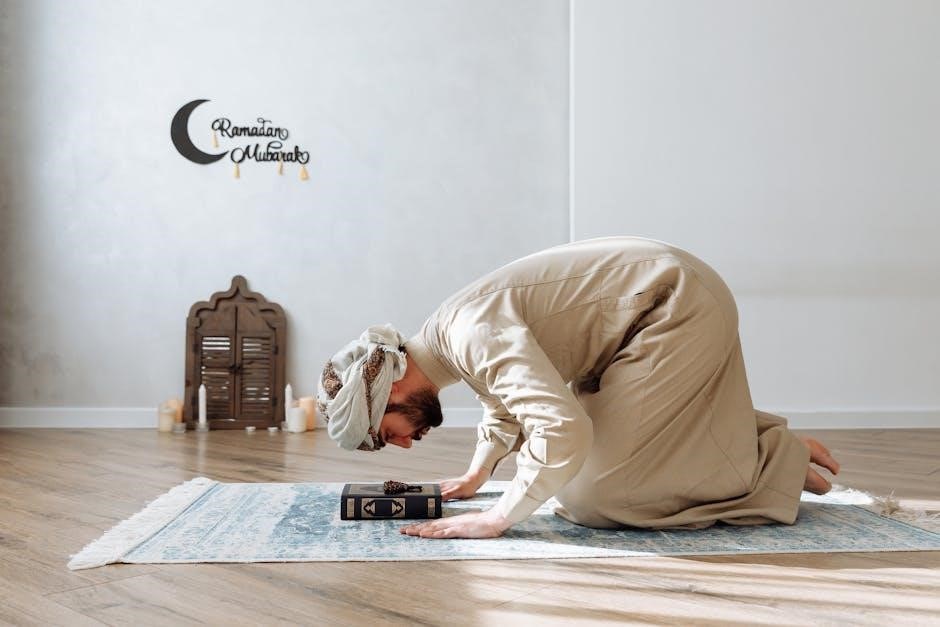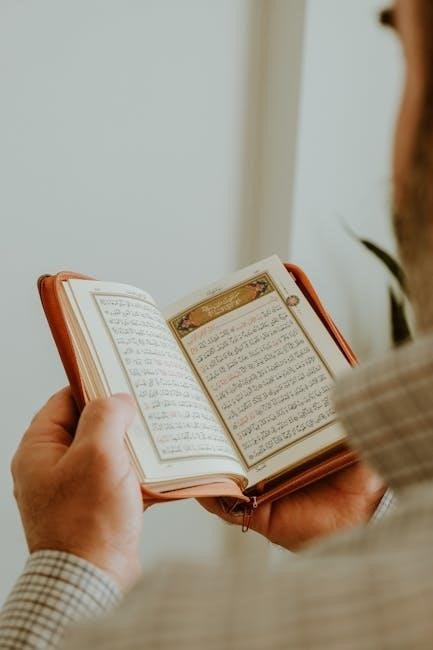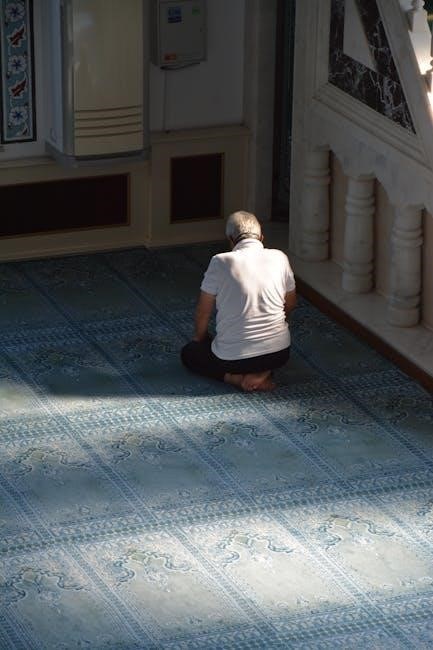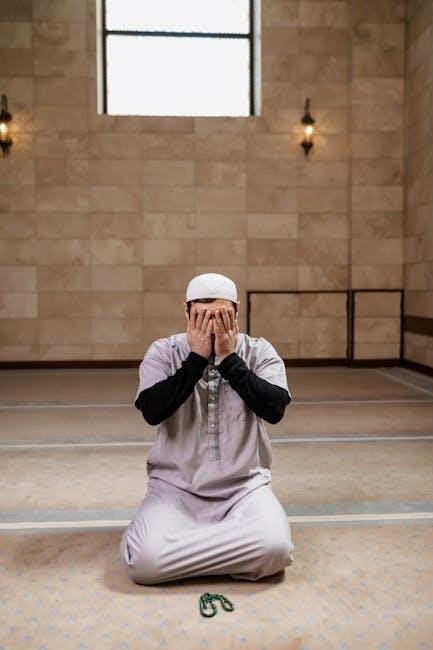Islam is a monotheistic faith emphasizing submission to God (Allah) through belief in one God, the Quran, and the prophethood of Muhammad․ It offers a comprehensive way of life, guiding spirituality, morality, and community, making it a diverse and vibrant faith followed by millions worldwide․
1;1 Core Beliefs of Islam
Islam is rooted in six core beliefs: faith in one God (Allah), the prophets, the holy books, angels, the Day of Judgment, and divine decree․ Muslims believe Allah is the sole creator and sustainer of the universe․ The Quran and Sunnah guide believers in worship, ethics, and daily life․ These beliefs shape a Muslim’s identity and purpose, fostering a deep connection with Allah and a commitment to righteous living․ They form the foundation of Islam, guiding individuals toward spiritual growth and moral integrity․
1․2 The Five Pillars of Islam
The Five Pillars are the foundational acts of worship in Islam, obligatory for all Muslims․ They include the Shahada (faith declaration), Salah (daily prayers), Zakat (charity), Sawm (fasting in Ramadan), and Hajj (pilgrimage to Mecca)․ These pillars strengthen faith, promote self-discipline, and foster a sense of community․ They are universal practices that unite Muslims worldwide, reflecting submission to Allah and commitment to a righteous lifestyle․ Each pillar has specific rulings and spiritual significance, guiding believers in their devotion and daily lives․
1․3 The Importance of the Quran and Sunnah
The Quran is the final revelation from Allah, serving as a guide for humanity, while the Sunnah represents the Prophet Muhammad’s (peace be upon him) teachings and practices; Together, they form the primary sources of Islamic legislation, morality, and spirituality․ The Quran provides divine wisdom, and the Sunnah offers practical examples, ensuring Muslims live according to Allah’s will․ They are indispensable for understanding Islam, shaping beliefs, and guiding daily actions to achieve a righteous and balanced life․

Daily Practices for Muslims
Muslims engage in daily practices like the Five Prayers, Fasting during Ramadan, and Charity (Zakat), fostering a deep connection with Allah and promoting personal and communal well-being․
2․1 The Obligation of Prayer (Salah)
Prayer, or Salah, is a fundamental obligation in Islam, performed five times daily at specific times․ It involves reciting the Quran, performing physical postures, and maintaining focus on Allah․ Muslims face the Kaaba in Makkah during prayers, symbolizing unity․ Salah fosters spiritual growth, discipline, and a direct connection with Allah, while also promoting mindfulness and gratitude throughout the day․ It is both a collective and personal act, strengthening the Muslim’s faith and character․
2․2 Fasting (Sawm) and Ramadan
Fasting, or Sawm, is a compulsory act of worship during Ramadan, the ninth month in the Islamic calendar․ Muslims abstain from food, drink, and other desires from dawn to sunset, fostering self-control, empathy for the needy, and heightened God-consciousness․ Ramadan is a blessed month of spiritual renewal, marked by increased Quranic recitation, nightly prayers, and charitable acts․ It culminates in Eid al-Fitr, a joyous celebration of gratitude and communal bonding, emphasizing faith, reflection, and moral growth․
2․3 Charity (Zakat) and Its Significance
Zakat, or obligatory charity, is a fundamental pillar of Islam, requiring Muslims to give 2․5% of their excess wealth to specified recipients․ It serves to purify one’s wealth, foster social justice, and support the needy․ Zakat promotes a sense of responsibility and equality within the Muslim community, while also cultivating humility and gratitude in the giver․ This act of charity strengthens both individual spirituality and societal harmony, reflecting Islam’s emphasis on compassion and shared prosperity․

Moral and Ethical Conduct
Islamic moral and ethical conduct emphasizes honesty, justice, and fairness․ Muslims are encouraged to uphold these values, rooted in Taqwa, fostering respect and compassion in all interactions․
3․1 Adab: Islamic Etiquette and Manners
Adab, or Islamic etiquette, is a cornerstone of Muslim character, emphasizing respect, humility, and kindness․ It encompasses proper conduct in speech, behavior, and interactions, reflecting a Muslim’s spiritual growth․ The Prophet Muhammad (peace be upon him) exemplified Adab, teaching the importance of greeting others with peace, respecting elders, and treating all people with compassion․ Practicing Adab fosters a harmonious society and strengthens one’s relationship with Allah․
3․2 The Concept of Taqwa (God-Consciousness)

Taqwa, or God-consciousness, is a central Islamic principle, referring to a state of awareness and mindfulness of Allah’s presence in all actions․ It involves living with integrity, humility, and accountability, as believers strive to align their deeds with divine guidance․ Taqwa is cultivated through prayer, reflection, and righteous behavior, serving as a moral compass that guides Muslims toward a virtuous and purposeful life, fostering a deep connection with their faith and community․ This concept is essential for spiritual growth․
3․3 Forbidden Actions (Haram) and Their Implications
In Islam, haram refers to actions or behaviors explicitly prohibited by Allah, as outlined in the Quran and Sunnah․ These include consuming pork, alcohol, and engaging in usury, as well as acts like adultery and slander․ Observing haram not only leads to spiritual harm but also negatively impacts societal well-being․ Muslims are encouraged to avoid such actions to maintain their moral integrity and uphold divine laws, ensuring a righteous and balanced life․ Intentionally engaging in haram can distance one from Allah․

Family and Social Life
Family and social life in Islam are rooted in harmony, mutual respect, and justice․ Islamic teachings emphasize the importance of strong familial bonds and community cohesion․
4․1 Islamic Teachings on Marriage and Family
Islamic teachings emphasize marriage as a sacred bond, fostering mutual respect, trust, and equity․ Men are urged to be providers, while women manage the household․ Both partners share responsibilities, promoting harmony․ Consent and kindness are central, with the Quran advocating for spouses as garments for one another, offering comfort and protection․ Family life is balanced between spiritual and material well-being, aiming to nurture a righteous and loving environment, reflecting Allah’s mercy and wisdom․
4․2 Gender Roles and Interactions in Islam
Islamic teachings outline distinct yet complementary roles for men and women, rooted in mutual respect and dignity․ Men are often expected to provide financially, while women manage the household, though modern contexts allow flexibility․ Interactions between genders are governed by modesty and decorum, emphasizing spiritual over physical connections․ The Quran underscores equity, prohibiting oppression, and encouraging harmony․ These principles aim to foster a balanced, righteous society where both genders contribute to the greater good․
4․3 Building a Strong Muslim Community
A strong Muslim community is built on mutual respect, cooperation, and shared values․ Collective worship, education, and social activities foster unity․ Encouraging open dialogue in forums and groups helps address challenges and promotes collaboration․ Continuous learning and adherence to Islamic principles ensure a harmonious and progressive society․ By supporting one another and upholding justice, Muslims can create a thriving community that reflects the teachings of Islam and inspires positive change․

Financial and Practical Responsibilities
Islamic finance emphasizes halal earnings and ethical spending․ Muslims are encouraged to manage wealth wisely, avoid riba, and fulfill zakat obligations to support community needs․
5․1 Islamic Finance and Halal Earnings
Islamic finance adheres to Sharia principles, prohibiting riba (interest) and gharar (uncertainty)․ Halal earnings involve ethical investments, avoiding industries like gambling or pork․ Muslims must ensure their income sources align with divine guidelines, fostering fairness and justice․ This approach promotes financial stability and moral integrity, encouraging sustainable economic practices that benefit both individuals and society․ By avoiding haram transactions, believers uphold their faith and contribute to a righteous economy․
5․2 Managing Wealth and Spending Wisely
In Islam, managing wealth wisely involves moderation and avoiding extravagance․ Muslims are encouraged to spend on necessities, save for the future, and allocate a portion for charity (Zakat)․ Proper financial planning ensures resources are used ethically and sustainably․ Avoiding haram investments and prioritizing halal earnings are essential․ This approach fosters a balanced lifestyle, promoting gratitude and contentment while fulfilling religious obligations and contributing to societal welfare․ Wise spending reflects a Muslim’s commitment to faith and responsible stewardship․
5․3 The Role of Jihad in Modern Contexts
Jihad, often misunderstood, refers to the struggle to live a righteous life and uphold justice․ In modern contexts, it encompasses personal efforts to resist sin and promote good․ Muslims are encouraged to engage in intellectual and community service forms of jihad, such as advocating for social justice and combating misinformation about Islam․ Education and peaceful activism are emphasized as vital tools for fulfilling this duty in contemporary society․

Personal Development and Spirituality
Personal growth in Islam involves self-reflection (Muhassabah) and nurturing a deep connection with Allah․ It emphasizes spiritual purification and balancing worldly life with faith, fostering inner peace․
6․1 The Importance of Self-Reflection (Muhassabah)
Self-reflection, or Muhassabah, is a vital Islamic practice that encourages Muslims to evaluate their actions, intentions, and spiritual state․ By regularly examining one’s deeds and thoughts, individuals can identify shortcomings, seek forgiveness, and strive for improvement․ This process fosters accountability, humility, and a deeper connection with Allah․ It also helps balance faith and worldly life, guiding believers toward righteous living and spiritual growth․ Muhassabah is essential for personal development and maintaining a strong, mindful Muslim identity․
6․2 Developing a Strong Connection with Allah
Building a strong bond with Allah is central to a Muslim’s life․ Through consistent prayer, recitation of the Quran, and sincere supplication, believers nurture their relationship with the Divine․ Engaging in acts of worship with mindfulness and devotion, along with regular remembrance of Allah, enhances spiritual closeness․ This connection provides guidance, comfort, and strength, enabling Muslims to navigate life’s challenges with faith and trust in Allah’s wisdom and mercy, fostering a deeper sense of purpose and fulfillment․
6․3 Overcoming Common Challenges as a Muslim
Muslims often face challenges such as balancing faith with modern life, maintaining identity in non-Muslim societies, and dealing with personal struggles․ Developing resilience through self-reflection (muhassabah) and seeking guidance from the Quran and Sunnah is essential․ Building a strong support network, staying connected to the Muslim community, and trusting in Allah’s plan helps navigate difficulties․ Prioritizing spiritual growth, seeking knowledge, and practicing patience are key to overcoming obstacles while staying steadfast in faith and upholding Islamic values․

Engaging with Non-Muslims
Engaging with non-Muslims involves fostering mutual respect, understanding, and peaceful coexistence․ Islam encourages building bridges through dialogue, sharing knowledge, and collaborating for the common good while maintaining Islamic values․
7․1 Building Bridges: Interfaith Dialogue
Building bridges through interfaith dialogue fosters mutual understanding and respect between Muslims and non-Muslims․ Engaging in open, respectful conversations helps dispel misconceptions and promotes peaceful coexistence․ Muslims are encouraged to share their beliefs and values, while listening to others, creating opportunities for collaboration and unity․ This approach strengthens community bonds and reflects Islam’s teachings on justice and compassion, emphasizing the importance of dialogue in building a harmonious society․
7․2 Sharing Islam with Others (Dawah)
Sharing Islam with others, known as Dawah, is a noble act encouraged in Islam․ Muslims are invited to share their faith with kindness, wisdom, and patience, following the Prophet Muhammad’s example․ Dawah involves conveying the message of monotheism and the teachings of the Quran through good character, clear communication, and compassionate interactions․ It is not about forcing beliefs but inviting others to consider Islam’s truths, fostering understanding and connection with others in a respectful and meaningful way․
7․3 Maintaining Identity in a Non-Muslim Society
Maintaining Islamic identity in a non-Muslim society requires balancing faith, culture, and community․ Muslims are encouraged to stay connected to their faith through prayer, hijab, and modesty, while engaging respectfully with others․ Building strong ties with Muslim communities and fostering a sense of belonging helps preserve Islamic values․ It also involves navigating cultural practices without compromising Islamic teachings, ensuring a harmonious coexistence that honors both personal faith and societal responsibilities․ This balance is key to thriving in diverse environments․
Islam offers a balanced path to a fulfilling life through faith, prayer, and community․ Embracing Islamic teachings fosters personal growth, moral integrity, and a strong spiritual connection with Allah․
8․1 Summarizing the Path to a Balanced Muslim Life
A balanced Muslim life revolves around faith, practice, and community․ By adhering to the Five Pillars, cultivating moral conduct, and engaging in self-reflection, Muslims can achieve spiritual harmony․ Embracing Islam’s teachings fosters personal growth, strengthens relationships, and builds a compassionate society․ This holistic approach ensures a life grounded in purpose and peace, aligning worldly responsibilities with eternal spiritual goals․ Islam guides believers to strive for excellence in all aspects of life․
8․2 Encouragement for Continuous Growth
Islam encourages believers to embrace a lifelong journey of learning and self-improvement․ By seeking knowledge, practicing humility, and engaging in righteous deeds, Muslims can grow spiritually and intellectually․ The faith motivates individuals to strive for excellence in all endeavors, fostering a mindset of continuous development․ This commitment to growth not only enriches personal faith but also benefits the broader community, creating a culture of positivity and shared progress․ Embrace this journey with dedication and purpose․

8․3 Final Thoughts on Living as a Muslim
Living as a Muslim is a journey of submission, peace, and purpose․ It requires embracing faith, practicing righteousness, and striving for balance in life․ Islam teaches believers to nurture their soul, engage with their community, and contribute positively to society․ By understanding and living according to Islamic principles, Muslims can find fulfillment and guidance in their daily lives․ Remember, the ultimate goal is to pleasing Allah, knowing that every action has a divine purpose and eternal consequence․